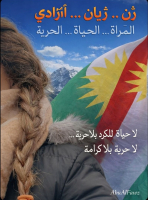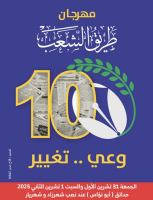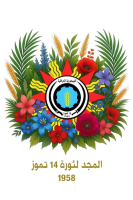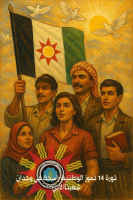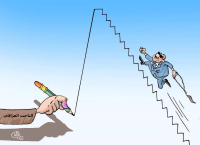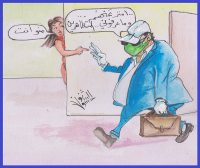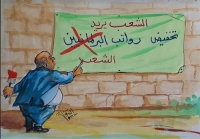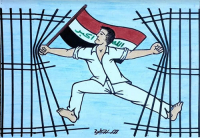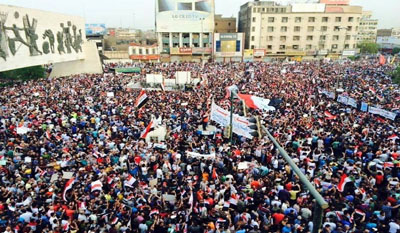
IRAQ: Towards a Civil Democratic State, Social Justice and Citizens’ Rights
The following interview with Comrade Salam Ali, member of the Central Committee of the Iraqi Communist Party, was conducted by "Nameh Mardom", the central organ of the Tudeh Party of Iran. It was published in its edition No.1047 on 19 March 2018.
The interview dealt with the recent important developments in Iraq and the electoral alliance of the Iraqi Communist Party in preparation for the parliamentary elections on 12 May 2018.
- To begin with, please could you briefly explain the current state of political affairs in Iraq and its effect on the daily lives of the people there? What urgent matters are the people facing?
The developments in Iraq during recent months have indicated contradictory trajectories. On one hand, a big national victory over Daesh and terrorism was achieved, liberating territories from its control. The prime minister declared his intention to combat corruption and also to open up on the Arab world and internationally. On the other hand, however, our country continues to languish under the burden of a deep structural crisis that is manifested in grave political and social-economic crises. These include the repercussions of the crisis caused by the Kurdistan region’s referendum last September, and the failure of the state to function properly. This had led to the deterioration of living conditions, the erosion of the real value of wages, increased dependence on oil revenues, the pursuance of the path of unfettered liberalism, and continued deterioration in industry, agriculture and services. In addition, there is the continuation of problems caused by the sectarian-ethnic quota system, sectarian politics and rampant corruption. The government has also failed to implement its own calls for putting arms under the control of the state, the equal application of the law, and tackling many other outstanding issues.
One of the urgent tasks is to ensure the speedy return of 2.3 million people, who had been displaced by Daesh and the battle to defeat it, to their homes. In addition, the catastrophic destruction inflicted on the city of Mosul and many towns requires huge efforts and international support. Tackling the heavy legacy of Daesh, which controlled vast areas for nearly two and a half years, after the fall of Mosul in June 2014, requires consistent efforts to repair the social fabric in liberated areas through societal reconciliation, and preventing any attempts to change the demographic structure of the population according to narrow political, sectarian and electoral calculations.
As a result of this situation, increasing numbers of people have refused the continuation of the status quo under the same political system and policies which have led to a resounding and miserable failure. Attempts by the ruling forces and blocs to contain the mounting popular resentment have failed to tackle the essence of the crisis; the sectarian-ethnic quota system.
The broad popular protest movement which has continued since late July 2015, with demonstrations in central Baghdad and other provinces, has become a significant factor in the political scene. It has galvanised the people into action, demanding political reform and real change. Our party, along with other civil democratic forces, have been active participants in this movement, with the aim of developing its momentum and broadening its ranks, in order to achieve a breakthrough that is essential to break the monopoly over power and bring about change towards a democratic national alternative.
- What are the latest developments in the fight against ISIS, other reactionary elements in the country and the presence of foreign states - including the US and Iran - in Iraq?
The military defeat of Daesh by the Iraqi armed forces, with all its formations, does not mean a final defeat of terrorism. Achieving this aim requires an integrated approach and policies on political, military-security, economic, cultural and medial levels. Areas liberated from Daesh are facing huge difficulties and challenges that require urgent action both by the central government and local authorities. In this respect, as pointed out earlier, societal reconciliation and effective administration on both security and civil levels, are crucial for ensuring the return of peace and stability, eliminating the remnants of Daesh and its sleeper cells, and preventing the return of terrorism in new forms.
The ferocious battle against terrorism and Deash in the region has provided a pretext for external interference in Iraq, Syria and other countries in the Middle East by the US imperialism and regional forces, particularly Turkey, Iran and Saudi Arabia. In the aftermath of the military defeat of Daesh by the Iraqi armed forces, there have been increasing calls for an end to the direct US military presence as part of an international coalition against Deash. The Iraqi government has declared its opposition to any permanent presence of foreign forces and military bases. It also reiterated its rejection of the presence of Turkish troops across the borders inside Iraq, in Nineveh province, demanding their withdrawal. Iran also repeatedly declared its determination to defend its own national security against external threats. Any escalation of the conflict between the US and Iran is bound to have a profound impact on the situation in Iraq and its future stability, and in the whole region. Russia is also competing with the US in the field of armaments, offering recently to provide Iraq with advanced aircraft.
In this context, it is worth mentioning that the “Arab and Islamic – US” summit that was held in Riyadh in May 2017, with the presence of the US president Donald Trump, revealed the efforts to strengthen the hegemony of the US over the region through establishing an international-Middle Eastern alliance that does not exclude a possible participation of, or support by, Israel. That summit also clearly indicated that the proposed alliance would confront the Iranian influence in the region. The sectarian dimension of the conflict, as indicated by the Riyadh summit, has raised fears of an escalation of the polarization, tension and an arms race, with the dangers of a military confrontation. This opens the door for more external interference and proxy wars that only serve regional and international agenda.
It is our party position that Iraq and our people have no interest whatsoever in deepening the regional and international polarization and the militarization of the Middle East. The party has called for keeping Iraq away from any axis, maintaining good-neighbourly relations and utilizing all available potential to defeat terrorism and achieve reconstruction. This requires rebuilding national unity, to enable Iraqis to confront foreign interference and open up prospects for Iraq’s development.
- Since early 2017 there have been reports of shifting alliances and a major realignment of political forces on the scene in Iraq... The visit by Moqtada al-Sadr to Saudi Arabia; the decision by Ammar al-Hakim to leave his position as leader of the Islamic Supreme Council of Iraq, the dominant party in Iraq's ruling Shiite alliance, and establish the National Wisdom Movement; and, even certain indications by Haider al-Abadi, the Iraqi Prime Minister, that he might consider standing on the ticket of a national secularist coalition of forces. In your view, what are the reasons for such developments?
This process of fragmentation, differentiation and realignment within the major blocs of ruling groups and forces has come about as a result of the deepening political crisis of sectarian-ethnic power-sharing (quota) system that has been in place since 2003 when it was installed and imposed after the US war and occupation. It accelerated under pressure from the popular mass protest movement which has continued since late July 2015 and has shaken the foundations of the political system, calling for reform and change, combating corruption and political sectarianism. Hundreds of thousands of people took part, at its peak, demonstrating under the Iraqi flag and civil slogans, stressing their Iraqi national identity, away from secondary identities, sectarian affiliation and bigotry. This movement, which has been consistently peaceful, despite various violent measures to suppress it, has had a big impact on the political life in Iraq and forced some of the ruling blocs to change tactics and employ various means to maintain their hold over political power. Some have co-opted civil figures, but this has not changed their predominantly sectarian character. Other ploys have included attempts to fragment the votes of civil forces by encouraging the formation of parties under civil titles.
Both so-called “Shiite” and “Sunni” blocs have witnessed splits and political restructuring. Inner struggles also intensified within constituents of the National Alliance, the biggest parliamentary bloc, such as the Daawa party and the Supreme Assembly. The Sadrist movement, which joined the mass protest movement in early 2016, split from the National Alliance and resisted external pressures to go back to it. It culminated this process by entering into a broad electoral coalition entitled “Saeroun” along with the Communist Party and few other groups of a liberal character. The Kurdistan bloc too witnessed internal conflicts and splits, especially after the referendum crisis in September 2017 and its negative repercussions for the Kurdistan region. Despite these splits, various sectarian groups have struck deals to come together after the parliamentary elections in May 2018 in order to maintain their monopoly over political power and reproduce the power-sharing (quota) system.
It should also be pointed out that despite the popular demands for amending the unjust electoral system, that employs the so-called Sainte-Lague system, the parliament which is dominated by the ruling blocs eventually kept the same electoral system with a divisor of 1.7, thus producing a high threshold which favors larger blocs. Previous elections were also witnessed widespread rigging and manipulation, compounded by corruption.
- The upcoming May election in Iraq will see a new and important development with respect to a strategic alliance between forces - made up of Communists, liberals and certain Islamist factions. What developments within Iraq’s present political landscape have led to such a diverse spectrum of forces forming an alliance, and what are the top three priorities of this national alliance’s ‘minimum programme’?
The new electoral coalition “Saeroun” (i.e., Marching toward Reform), which includes the Communist Party, the “Istiqama” (Integrity) Party, which is backed by the Sadrists, and four other groups of a liberal character, was announced in Baghdad on 12 January 2018. This development was in line with our party policy that was endorsed by its 10th National Congress held in December 2016. It also came about as an outcome of the popular protest movement which has been continuing since July 2015 with a broad participation of civil activists, including Communists and their supporters, as well as the Sadrists (i.e. supporters of Muqtada al-Sadr). In the course of this movement and during demonstrations and protests, relations of cooperation and coordination over joint slogans and demands developed, that called for reform and change, combating corruption, provision of services and alleviating the suffering of the popular strata, as well as establishing a state based on citizenship; a democratic civil state based on social justice.
Our party’s 10th National Congress pointed out that in view of the deadlock caused by the deep political crisis gripping Iraq, and the rulers’ insistence on their bankrupt policies and positions, change has become an urgent objective necessity. It can only be achieved through an alternative that puts an end to the system of political sectarianism and opens up a horizon and a space for establishing a democratic civil state. Such an extensive and significant change would require new forces and alliances that can bring about a real change in the balance of effective forces, rather than reproducing the system of sectarian-ethnic power sharing.
The party’s Congress also stressed that achieving a state based on the principle of citizenship, law, institutions and true democracy requires a persistent and accumulative struggle, and supra confessional national civil alliances and alignments, and the mobilisation of a broad spectrum of forces that support reform and change. Based on this policy, the party’s Central Committee meeting in December 2017 called for continuing the work with the Democratic Current (movement) to open up on all the civil and democratic forces. It also pointed out that developments and the continuing protest movement had indicated the possibility of cooperation and coordination with broader national forces, including some moderate and enlightened Islamists. These developments laid the basis for striving to set up a broad national democratic civil alignment, in order to form a big electoral bloc that would contest the elections, break the monopoly of political power and open up the path toward a democratic civil alternative.
- The Sadrist forces have been reputed to be politically erratic, self-centred and heavily reliant on the regime in Tehran. Considering the historic background of Islamists - and what has taken place in Iran over the past four decades - please could you elaborate on the decision of the Iraqi Communist Party to take part in this strategic alliance? Are there other political forces that you are planning to ally with in this election?
As pointed out earlier, the Sadrists distanced themselves from sectarian politics, joined the mass protest movement that had been launched earlier by democratic civil forces, supported its demands against corruption and the sectarian-ethnic quota system, and for political reform. They pulled out their ministers from government and eventually split from the grand “Shiite” coalition that had dominated political power and shared power with “Sunni” and “Kurdistani” blocs on the basis of the basis of the sectarian-ethnic quota system. Cooperation and coordination also developed with between the Sadrists, Communists and civil activists in the coordinating committees of the protest movement in Baghdad and other provinces.
The new electoral coalition “Saeroun” has a civil national identity and clear objectives that serve the interests of the Iraqi people and their desire to end political sectarianism and corruption. Its inner rules also stress the political, ideological and organisational independence of its constituent parties. The main slogan raised when the coalition was launched in Baghdad was “For Building a Civil State .. Citizenship and Social Justice”. As pointed out by Comrade Raid Fahmi, the Secretary of our party’s Central Committee, during that event, the coalition will strive to strengthen Iraq’s national sovereignty and independence, and ensure the equal participation of citizens in all political and social aspects within a unified federal and democratic Iraq. Its programme considers elevating the role of women and youth in Iraq’s political life among its most important objectives. The party has also reaffirmed its determination to continue to its relations and cooperation with other democratic civil forces, before the elections and afterwards.
As for concerns raised in the question, regarding the historic background of Islamists and the Iranian experience, it is important to take into account the need for a concrete analysis of the concrete conditions in Iraq and its own specifics, including the Islamic forces. The replies to previous questions, dealing with the political landscape and developments, and the urgent need for change and saving the country from sliding further into the abyss of political sectarianism with catastrophic consequences, may be useful in this respect.
- On 18thFebruary 2018, Ali Akbar Velayat, the Special Advisor to the Supreme Leader, Khamenei, dictated the Islamic Republic of Iran’s terms and conditions for the upcoming May election in Iraq, by stating that “the Islamic awakening will not allow the communists and liberals to return to power in Iraq”. What is your view on this blatant interference in Iraq?
The statement delivered by Velayeti in Baghdad on 17th February was clearly referring to the electoral coalition “Saeroun”, between the Sadrists and Iraqi Communists. It sparked controversy and drew criticism from various Iraqi political forces and figures.
The head of “Saeroun”, Dr Hassan al-Aqouli, issued a statement indicating his rejection of foreign interference in Iraqi institutions or attempts to influence Iraq’s internal decision. He defended the diversity within the coalition, saying that “no external voice can undermine it, dismantle it or exclude it from its place in leading the country to safety, away from sectarian elements, terrorists and the corrupt.”
The Communist Party considered Velayeti’s statement an interference in Iraq’s internal affairs and a blatant violation of Iraq’s Constitution under which the Communists and liberals are working, as political parties that are officially licensed in accordance with the Iraqi Law of Parties. It warned that allowing such statements would open the door to further interference that aims at influencing the results of the elections and its freedom.
The party also stated that it strives always to develop good relations between Iraq and its neighbours on the basis of mutual interests, respect for the independence and sovereignty of states and the choices of their peoples, and non-interference in their internal affairs.


